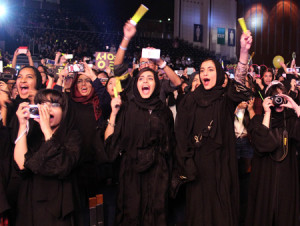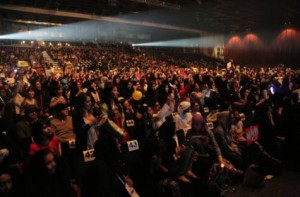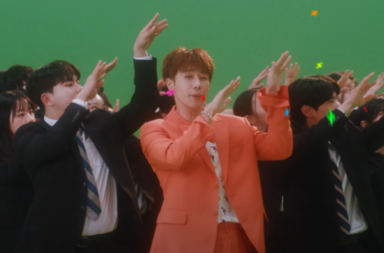 Exporting pop culture is difficult, in the sense that it’s not a tangible product that can be consumed or used by customers. It’s an idea that envelopes music and arts all the way to cuisine and history.
Exporting pop culture is difficult, in the sense that it’s not a tangible product that can be consumed or used by customers. It’s an idea that envelopes music and arts all the way to cuisine and history.
After exploring the various means the “Hallyu Wave” is flowing in to the Middle East, and how its prosperity in the region seems well anticipated, we will now attempt a further look in to the matter and identify where it could all go wrong.
It’s important to understand that while there are multitude of things that may hinder the progress of K-pop in to the Middle East, racial and cultural insensitivity form only a small part. However these are serious issues that shouldn’t be ignored. They are sure to cause tension and have done so in the past. The CL and Quran issue aside, misrepresentation within Korean entertainment of the Middle East will not help its perception amongst Middle Easterners all over the region.
An example of the above that occurred on mainstream TV was during one episode of Star King. The episode included Mighty Mouth’s Shorry J and MBLAQ’s Lee Joon, amongst others. It opened with a young Korean-American girl from Saudi Arabia entering the studio wearing full body veil surrounded by her posse of other veiled women. She then proceeded to strip down to a dress as she was singing. Once she was done, Kang Ho-dong tried to shake her hand, but was unable to make any contact for Shorry J arrived on the scenes holding a machine gun and wearing traditional Arab attire — exclaiming a slewed “Assalamualaikum.” Threatening Kang Ho-dong continued for a few frames until the girl put the hullabaloo to rest by exclaiming that “It’s against the law for a man and woman to be very close in Saudia Arabia.” Putting aside the perplexing issue of how they must conceive under such circumstances, it’s not hard to see where this falls out of line.
[youtube https://www.youtube.com/watch?v=x9MKwKzPN9E]Continuing this streak, incidents such as Leetuk’s impersonations of a “Dubai Prince” during the Super Show 3 in Asia also raised eyebrows. The entire skit was full of stereotypical caricatures of many races and cultures around the world (“Sancho Sungmin”, “Pharaoh Kyuhyun”, “Eunhyuk the Amazonian”) but to top it off with Leetuk pulling out a wad of cash from within the kaffiyeh (traditional checkered scarf) he had placed on his head, is beyond understanding. I don’t think there was one race/culture within the skit, that they didn’t manage to offend.
Religious appropriation, in light of the CL and Quran debacle that occurred not too long ago, is starting to become a little bit of an issue within K-pop and Korean entertainment. During the Mnet MKMF 2008 Awards, Jaurim used a portion of the Adhaan (the Islamic call to prayer) as part of their performance. Though used out of ignorance as was later confirmed by the band and their managing team, it still begs the question of whether using religious material within your content is appropriate.
 It does seem that religion is a common thread that runs through the problem. It should be so too, as Islam is one of the major religions within the Middle Eastern world. However, it is important to understand that it is not the only religion that predominates the region; Christianity, Judaism, Baha’is are a few morsels of the religious richness present in this area of the world. For production companies to dumb that down to just one religion, is a gross form of over-simplification that is unacceptable.
It does seem that religion is a common thread that runs through the problem. It should be so too, as Islam is one of the major religions within the Middle Eastern world. However, it is important to understand that it is not the only religion that predominates the region; Christianity, Judaism, Baha’is are a few morsels of the religious richness present in this area of the world. For production companies to dumb that down to just one religion, is a gross form of over-simplification that is unacceptable.
The prevalent image of the stereotypical “Arab” has caused problems in the West, for fear of alienating members of its own diverse community. If this was shown on popular TV shows in the West today, there would be no time wasted in condemning the actions from amongst its own crowd for being racist or stereotypical. However, this was not the case around the 80’s — even arguably before that; whereby the depiction of Middle Easterners were split neatly in to a few over-simplified categories (the Arab as the terrorist, in the desert, as barbaric, as belly dancers etc) which obviously didn’t do justice to the breath of diversity present within the region. It is possible that the Korean entertainment industry, may also go through this period of friction but ultimately, as K-pop becomes more globalised, it may naturally adopt a more international-friendly view on race and culture.
The interesting thing about the Middle East is that it’s bigger than people think it is. The culture is heavily influenced by the diversity in religions and ethnicities present in the region. From Oman all the way to Turkey, the Middle East is home to numerous and long established ethnic groups. These consist not only of Arabs but also Turks, Persians, and Jews amongst many. Thus, it becomes important to identify that racism and cultural insensitivity may be interpreted differently in the Middle East as its culture is quite complex. For instance, the theocratic Saudi Arabia, will have a much different culture to secular Turkey.
Korean entertainment companies may also find that the politically volatile nature of the countries that has increased in the recent years, will present a bigger friction to the foray in the Middle East. Certain areas of the region have been plagued with war, unfair dictatorships, and revolution. The Middle East holds some of the richest and poorest countries in the entire world so it is no surprise that Infinite held their concert in Dubai and not Gaza. It makes sense for ZE:A and Nine Muses to visit the UAE and not Syria. The political and economic situation would prove fatal to the attempts at expansion in these specific countries — not to mention put the life of their artists at risk. Another question is of sales, who in all honesty would buy a concert ticket if they weren’t able to afford food or the freedom to walk around without a curfew? It is important to note, that this region is undergoing some very radical changes in a very short space of time, and though its future is unsure it doesn’t mean that it is a lost cause.
 Though the above may seem quite difficult to overcome, in actuality all it may take is a few geography and history lessons. Through educating Korean companies about the richness of the markets they wish to expand in to, issues of racism and stereotyping may be eradicated. This is the way that it should be, considering that there are many Middle Eastern fans of K-pop who actively engage with the international K-pop community in bringing a bit of the genre to their lands. Their enthusiasm and dedication to the K-pop cause is fuel enough to start taking the foray in to the region seriously.
Though the above may seem quite difficult to overcome, in actuality all it may take is a few geography and history lessons. Through educating Korean companies about the richness of the markets they wish to expand in to, issues of racism and stereotyping may be eradicated. This is the way that it should be, considering that there are many Middle Eastern fans of K-pop who actively engage with the international K-pop community in bringing a bit of the genre to their lands. Their enthusiasm and dedication to the K-pop cause is fuel enough to start taking the foray in to the region seriously.
(YouTube [1] [2] [3], IMDB, RaceRelations, Daniel Meissler, CIA, MWave, Al-Jazeera Images via Fahad fadel, SBS, Gulf News)


